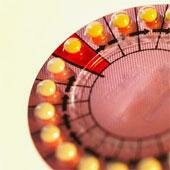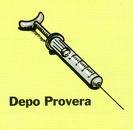PILLS
In general pills are very popular. Often pills called also “birth control pills” and/or “combined pills” and/or “combined oral contraceptives (COC)”. The effectiveness of different brands is fluctuating between 95% - 99% (if correctly used!). Combined pills contain estrogens and progesterone (or similar gestagens). The contraceptive effect of COCs is mainly due to inhibition of ovulation; they also cause thickening of the cervical mucus, making it difficult for sperm to pass into the uterine cavity and move towards the fallopian tubes. The receptivity of the uterus (endometrium) to the fertilized eggs is also reduced. It is very important to
mention that different brands suit different persons.
Some advantages:
• Very effective,
• Side effects uncommon,
• Helps ease painful and heavy periods,
• Reduces the chance of some cancers.
Some disadvantages:
• Small risk of serious problems (eg thrombosis),
• Some women get side-effects,
• Have to remember to take it every day at certain time,
• Can't be used by women with certain medical conditions. |
 |
PROGESTERON ONLY PILLS (“mini pills”)
This kind of hormonal contraception contains just a progestogen hormone. Effectiveness is reaching 99% if used properly. This contraception method is recommended if the combined contraception (pills) is not suitable. For example: breast-feeding women, smokers over the age of 35, and some women with migraine. Works mainly by causing a plug of mucus in the cervix that blocks sperm, and by thinning the lining of the uterus. May also stop ovulation.
Some advantages:
• Less risk of serious problems than the combined pill.
Some disadvantages:
• Periods often become irregular,
• Some women have side-effects,
• Not quite as reliable as the combined pill,
• Could be less effective in obese women (over 70kg). |
 |
CONTRACEPTIVE INJECTIONS (eg Depoprovera and Noristerat)
Contains a progestogen hormone which slowly releases into the body. Effectiveness is about 97-99%. Works by preventing ovulation and also has similar actions as progestogen only pills. An injection is needed every 8-12 weeks.
Some advantages:
• Very effective,
• Don't have to remember to take pills.
Some disadvantages:
• Periods may become irregular (often lighter or stop altogether),
• Some women have side effects,
• Normal fertility after stopping may be delayed by some months,
• Can't undo the injection, so if side effects occur they may persist for 8-12 weeks or slightly longer.
|
 |
CONTRACEPTIVE IMPLANTS (eg Implanon)
An implant is a small device placed under the skin. Contains a progestogen hormone which slowly releases into the body. It is more than 97-99% effective. Works in a similar way to the contraceptive injection. Involves a small minor operation using local anesthetic. Each one lasts 3 years.
Some advantages:
• Very effective,
• Don't need any attention or every day management.
Some disadvantages:
• Periods may become irregular (but often lighter or stop altogether),
• Some women develop side effects but these tend to settle after the first few months. |
 |
General nformation about modern contraception, barrier methods, intrauterine devices (IUDs), sterilization, natural methods, dual contraception and emergency contraception you can discover in following pages - Contraception (Part I) and (Part III).
|